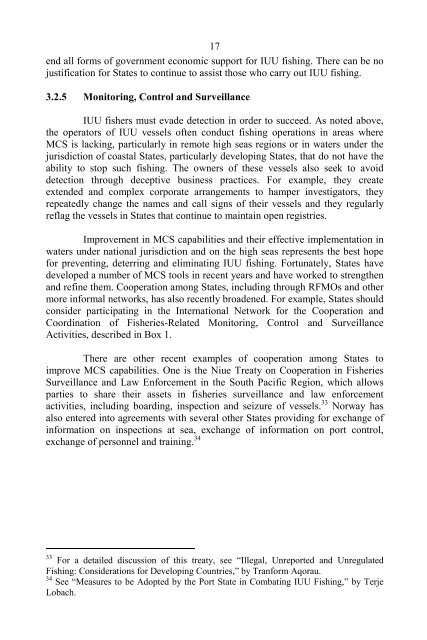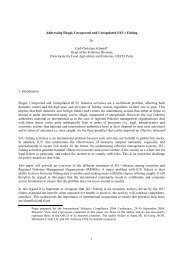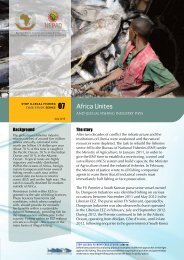Implementation of IPOA/IUU - International MCS Network
Implementation of IPOA/IUU - International MCS Network
Implementation of IPOA/IUU - International MCS Network
Create successful ePaper yourself
Turn your PDF publications into a flip-book with our unique Google optimized e-Paper software.
17end all forms <strong>of</strong> government economic support for <strong>IUU</strong> fishing. There can be nojustification for States to continue to assist those who carry out <strong>IUU</strong> fishing.3.2.5 Monitoring, Control and Surveillance<strong>IUU</strong> fishers must evade detection in order to succeed. As noted above,the operators <strong>of</strong> <strong>IUU</strong> vessels <strong>of</strong>ten conduct fishing operations in areas where<strong>MCS</strong> is lacking, particularly in remote high seas regions or in waters under thejurisdiction <strong>of</strong> coastal States, particularly developing States, that do not have theability to stop such fishing. The owners <strong>of</strong> these vessels also seek to avoiddetection through deceptive business practices. For example, they createextended and complex corporate arrangements to hamper investigators, theyrepeatedly change the names and call signs <strong>of</strong> their vessels and they regularlyreflag the vessels in States that continue to maintain open registries.Improvement in <strong>MCS</strong> capabilities and their effective implementation inwaters under national jurisdiction and on the high seas represents the best hopefor preventing, deterring and eliminating <strong>IUU</strong> fishing. Fortunately, States havedeveloped a number <strong>of</strong> <strong>MCS</strong> tools in recent years and have worked to strengthenand refine them. Cooperation among States, including through RFMOs and othermore informal networks, has also recently broadened. For example, States shouldconsider participating in the <strong>International</strong> <strong>Network</strong> for the Cooperation andCoordination <strong>of</strong> Fisheries-Related Monitoring, Control and SurveillanceActivities, described in Box 1.There are other recent examples <strong>of</strong> cooperation among States toimprove <strong>MCS</strong> capabilities. One is the Niue Treaty on Cooperation in FisheriesSurveillance and Law Enforcement in the South Pacific Region, which allowsparties to share their assets in fisheries surveillance and law enforcementactivities, including boarding, inspection and seizure <strong>of</strong> vessels. 33 Norway hasalso entered into agreements with several other States providing for exchange <strong>of</strong>information on inspections at sea, exchange <strong>of</strong> information on port control,exchange <strong>of</strong> personnel and training. 3433 For a detailed discussion <strong>of</strong> this treaty, see “Illegal, Unreported and UnregulatedFishing: Considerations for Developing Countries,” by Tranform Aqorau.34 See “Measures to be Adopted by the Port State in Combating <strong>IUU</strong> Fishing,” by TerjeLobach.
















